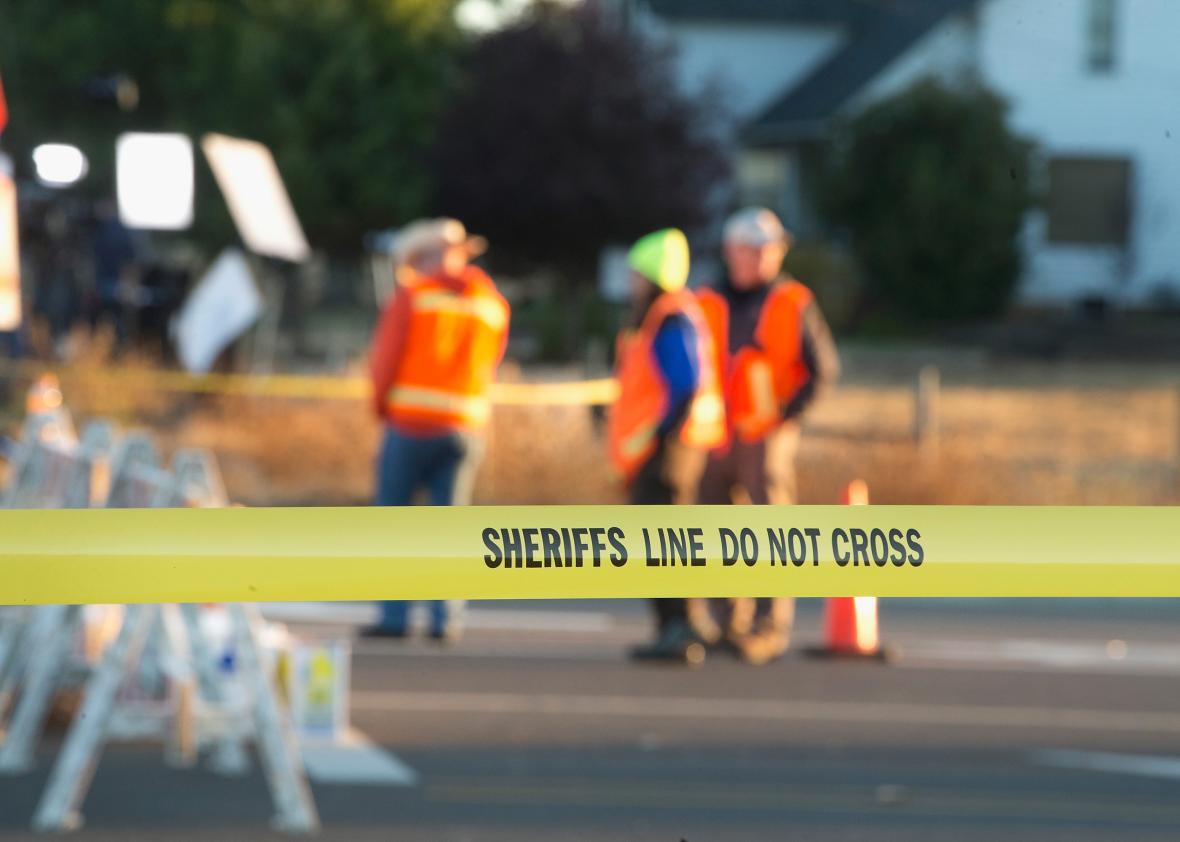If the mass shooting at Umpqua Community College in southern Oregon on Thursday seemed sadly familiar, then so did the world’s response. Journalists rushed to Roseburg, Oregon, and before the day was out, nonjournalists began arguing that it would be inappropriate to name the 26-year-old man who used several guns to murder nine people in cold blood.* “I will not name the shooter,” said Douglas County Sheriff John Hanlin on Thursday, speaking for many ordinary people who have registered similar feelings on social media and have encouraged the media to follow suit. “I will not give him the credit he probably sought prior to this horrific and cowardly act.”
The shooter’s name was Chris Harper Mercer. And he already got what he wanted.
Don’t name the shooter. In the aftermath of a mass shooting, some well-meaning person—maybe a cop, maybe a relative of one of the victims—will inevitably enjoin the media to withhold the attacker’s name, in order to prevent copycat killings and deny the shooter the notoriety that he so clearly craved. People said it this August, in Roanoke, Virginia, after television journalist Vester Lee Flanagan used a Glock 9mm pistol to murder two of his former colleagues. People said it this June, after Dylann Roof used another Glock to murder nine people at a prayer meeting in Charleston, South Carolina. People say this after every single mass shooting. This censorial impulse is smarmy and wrong.
Journalists are not supposed to elide relevant facts when reporting a news story just because reporting those facts might strike some people as offensive or wrong. This is partially a matter of clarity—it would be tedious and confusing to have to write around Chris Harper Mercer’s name and just refer to him as “the shooter”—and partially because it is essential for journalists to report causation when causation is knowable. The Umpqua Community College massacre didn’t just happen. A ghost didn’t kill all those people. Chris Harper Mercer did it with guns he acquired easily, because we live in a country where it is very easy to acquire guns.
Journalists are not putting Mercer’s name, photo, and life story on television and on the front pages because they want to give him glory. They are doing so because he shot up a school, and we know that he did it, and his name, likeness, and biographical data are very, very newsworthy. This is what a mass murderer looks like. This is how he lived. These are the things he professed in public.
Hard-news reporters are supposed to go to news events and answer some very basic questions: what, where, when, and whom. With rare exceptions, if you know a fact, you should report it. Shootings like this latest rampage at Umpqua Community College are ghastly tragedies, but they are also news, and asking journalists to refrain from reporting the news is something that is ultimately much worse for society than giving a shooter “what he wanted.”
Chris Harper Mercer probably did want to be on the news, and, sure, by putting him on the news, journalists are giving him “what he wanted.” But it seems clear to me that what Chris Harper Mercer mostly wanted was guns he could use to execute lots of people. He got them. We already gave him what he wanted. Mass shootings in America will never slow or cease until journalists recognize and report on their cause. Because causation is knowable here. And it has nothing to do with a shooter’s vague desire to be on CNN.
See more of Slate’s coverage of the Oregon shooting.
*Correction, Oct. 2, 2015: Due to an editing error, this post originally misstated that Chris Harper Mercer murdered 10 people. He killed nine people and also died himself.
